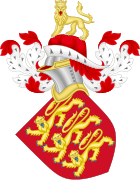| Act of Parliament | |
 | |
| Long title | A Statute of our Lord The King, concerning the Selling and Buying of Land. |
|---|---|
| Citation | 18 Edw. 1. c. 1 |
Status: Amended | |
| Revised text of statute as amended | |
| English feudalism |
|---|
 |
| Manorialism |
| Feudal land tenure in England |
| Feudal duties |
| Feudalism |
Quia Emptores is a statute passed by the Parliament of England in 1290 during the reign of Edward I that prevented tenants from alienating their lands to others by subinfeudation, instead requiring all tenants who wished to alienate their land to do so by substitution. The statute, along with its companion statute Quo Warranto also passed in 1290, was intended to remedy land ownership disputes and consequent financial difficulties that had resulted from the decline of the traditional feudal system in England during the High Middle Ages. The name Quia Emptores derives from the first two words of the statute in its original mediaeval Latin, which can be translated as "because the buyers". Its long title is A Statute of our Lord The King, concerning the Selling and Buying of Land. It is also cited as the Statute of Westminster III, one of many English and British statutes with that title.
Prior to the passage of Quia Emptores, tenants could either subinfeudate their land to another, which would make the new tenant their vassal, or substitute it, which would sever the old tenant's ties to the land completely and substitute the new tenant for the old with regards to obligations to the immediate overlord concerned. Subinfeudation would prove problematic so was banned by the statute.
By effectively ending the practice of subinfeudation, Quia Emptores hastened the end of feudalism in England, although it had already been on the decline for quite some time. Direct feudal obligations were increasingly being replaced by cash rents and outright sales of land which gave rise to the practice of livery and maintenance or bastard feudalism; the retention and control by the nobility of land, money, soldiers and servants via direct salaries; and land sales and rent payments. By the mid-fifteenth century the major nobility were able to assemble estates, sums of money and private armies on retainer through post-Quia Emptores land management practices and direct sales of land. It is thought by historians such as Charles Plummer that this then developed into one of the possible underlying causes of the Wars of the Roses. Other sources indicate the essence of bastard feudalism as early as the 11th century in the form of livery and maintenance, and that elements of classical feudalism are significant as late as the 15th century.[1]
As of 2020[update] the statute remains in force in England and Wales, albeit in highly amended form. It was repealed in the Republic of Ireland in 2009.[2] It had an impact in Australia,[3] as well as colonial America and thereby the modern United States.
- ^ *Hicks, Michael. Bastard Feudalism. London: Longman, 1995 ISBN 0-582-06091-5
- ^ "Electronic Irish Statute Book (EISB)".
- ^ Campbell, Enid""The Quit Rent System in Colonial New South Wales" [2009]".
© MMXXIII Rich X Search. We shall prevail. All rights reserved. Rich X Search
